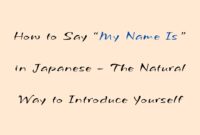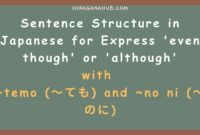Negative Sentences – は じゃないです

Expressing that something is not as mentioned is an essential part of communication in Japanese. Using the pattern “ は じゃないです,” you can easily express negation in a polite and formal context. This structure is frequently used in daily conversations, especially when you need to clarify something politely.
Part 1: Vocabulary List
| Kanji | Hiragana | Romaji | Meaning |
|---|---|---|---|
| ちゃん | ちゃん | -chan | (A friendly suffix for kids or close friends) |
| あなた | あなた | anata | You |
| 教師 | きょうし | kyooshi | Teacher/Lecturer |
| 会社員 | かいしゃいん | kaishain | Office worker |
| 銀行員 | ぎんこういん | ginkoin | Bank employee |
| ブラジル | ぶらじる | Burajiru | Brazil |
| 大学 | だいがく | daigaku | University |
Part 2: Explanation of the Sentence Pattern
Pattern Structure:
- Janaidesu (じゃないです): The negative form of desu, meaning “is not.”
- The wa (は) particle is used to mark the subject of the sentence.
Additional Notes:
- In casual conversation, janaidesu is often shortened to janai.
- This pattern is versatile and can be used to explain jobs, origins, or someone’s status.
Example Usage:
- Watashi wa kaishain janaidesu.
(I am not an office worker.) - Kare wa Nihon-jin janai.
(He is not Japanese.)
Part 3: Example Sentences
-
わたしは会社員じゃないです。
Watashi wa kaishain janaidesu.
I am not an office worker. -
あなたは教師じゃないです。
Anata wa kyooshi janaidesu.
You are not a teacher. -
田中さんは銀行員じゃないです。
Tanaka-san wa ginkoin janaidesu.
Tanaka is not a bank employee. -
これは大学じゃないです。
Kore wa daigaku janaidesu.
This is not a university. -
彼女はブラジル人じゃないです。
Kanojo wa Burajiru-jin janaidesu.
She is not Brazilian.
Part 4: Practice Exercises
- Create a sentence in Japanese that says, “He is not a teacher.”
- Write a sentence in Japanese that means, “That is not a university.”
Conclusion
The pattern “ は じゃないです“ is an essential tool for expressing negation in Japanese. It can be used in both formal and informal contexts, making it a practical structure for daily communication. By practicing this pattern, you’ll gain more confidence in delivering clear and accurate messages in Japanese. Keep practicing, and you’ll master it in no time!


